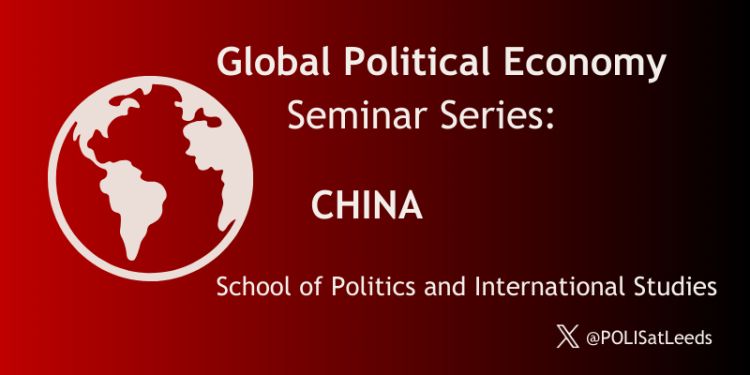Global Political Economy Seminar - Capitalist reforms and extreme poverty in China

- Date: Monday 22 April 2024, 18:00 – 20:00
- Location: Parkinson SR (B.22)
- Cost: Free
POLIS is delighted to bring you the sixth seminar as part of its Global Political Economy Series!
Monday 22nd April | Parkinson SR (B.22) & Zoom | 6pm-8pm (GMT)
Speaker: Dylan Sullivan (Macquarie University, Sydney)
Capitalist reforms and extreme poverty in China: unprecedented progress or income deflation?
Abstract
It is widely believed that China's socialist economy had relatively high rates of extreme poverty while the capitalist reforms of the 1980s and 1990s delivered rapid progress. This narrative relies on World Bank estimates of the share of people living on less than $1.90 a day (2011 PPP), which show a sharp decline from 88% in 1981 to zero by 2018. However, the World Bank’s poverty line suffers from a significant empirical limitation in that it does not account for variations in the actual cost of meeting basic needs. This presentation reports on recent research, published in New Political Economy, which measures extreme poverty as the share of the population unable to afford a subsistence basket. These estimates indicate that from 1981 to 1990, when most of China’s socialist provisioning systems were still in place, the country’s extreme poverty rate was on average only 5.6 per cent, substantially lower than in capitalist economies of comparable size and income at the time: 51 per cent in India, 36.5 per cent in Indonesia, and 29.5 per cent in Brazil. Moreover, extreme poverty in China increased during the capitalist reforms of the 1990s, reaching a peak of 68%, as privatisation inflated the cost of essential goods and thus deflated the incomes of the working classes. While the extreme poverty rate recovered in the 2000s, it has not yet fallen to the very low level reported by the World Bank. These results suggest that public provisioning and socialist planning can be effective at reducing or eliminating extreme poverty, while market-oriented reforms may threaten people’s ability to meet basic needs.
Biography

Dylan Sullivan is a lecturer and PhD candidate in the School of Social Sciences at Macquarie University, Sydney. He is best known for his research with Jason Hickel (Autonomous University of Barcelona) on long-term trends in global poverty, which has resulted in two major publications challenging the widespread belief that extreme poverty has declined precipitously under capitalism. These publications include ‘Capitalism and extreme poverty: A global analysis of real wages, human height, and mortality since the long-16th century’, published in World Development, and ‘Capitalist reforms and extreme poverty in China: Unprecedented progress or income deflation?’, published in New Political Economy. Sullivan is also co-author of the widely noted article ‘Plunder in the Post-Colonial Era: Quantifying Drain from the Global South Through Unequal Exchange, 1960–2018’ (New Political Economy). Currently, Sullivan is expanding on this research as part of his PhD thesis – A Political Ecology of Global Poverty – including by developing alternative poverty lines based on requirements for 'decent living' in the 21st century. Sullivan writes on international development and social policy for Al Jazeera, The Conversation, Monthly Review, and New Internationalist. He holds a BA in political Economy from Macquarie University, and an Honours research degree in political economy from the University of Sydney.
This event will take place in a hybrid manner. The in-person venue on campus is SR 2.22 in the Parkinson Building. For in-person attendees, there will be refreshments and snacks provided!
Attendance is also welcomed online via the Zoom link:
https://universityofleeds.zoom.us/j/88322760943?pwd=YjN5VmMwN3NkWkMwRVFyUm1STENIUT09
Meeting ID: 883 2276 0943
Passcode: mt*1xA
Please direct any queries to Dr Jörg Wiegratz (J.Wiegratz@leeds.ac.uk).

